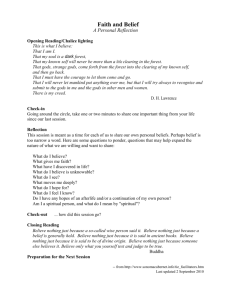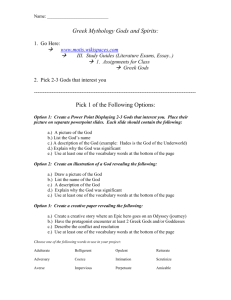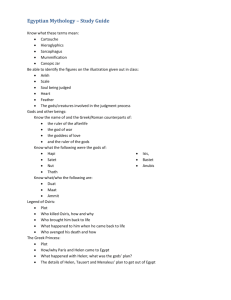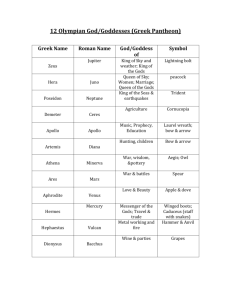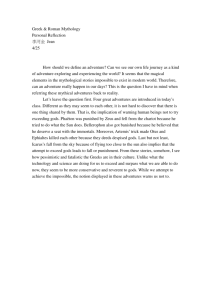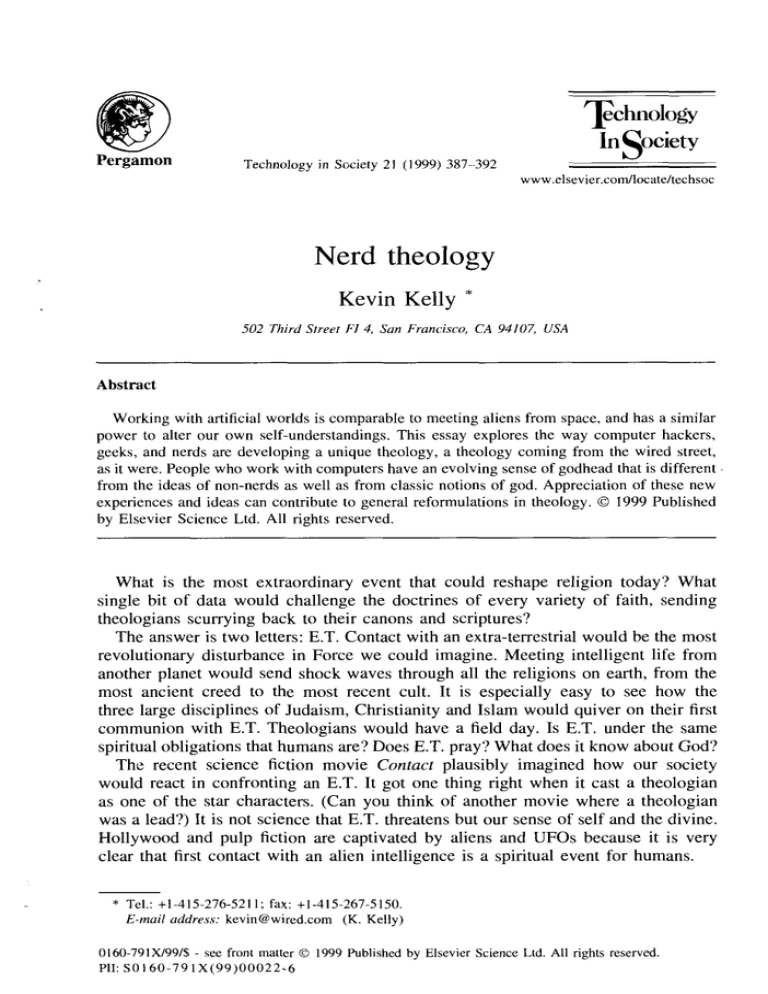
Technology
In Society
Pergamon
Technology in Society 21 (1999) 387-392
www.elsevier.com/locate/techsoc
Nerd theology
Kevin Kelly *
502 Third Street F l 4, Sun Francisco, CA 94107, USA
Abstract
Working with artificial worlds is comparable to meeting aliens from space, and has a similar
power to alter our own self-understandings. This essay explores the way computer hackers,
geeks, and nerds are developing a unique theology, a theology coming from the wired street,
as it were. People who work with computers have an evolving sense of godhead that is different ,
from the ideas of non-nerds as well as from classic notions of god. Appreciation of these new
experiences and ideas can contribute to general reformulations in theology. 0 1999 Published
by Elsevier Science Ltd. All rights reserved.
What is the most extraordinary event that could reshape religion today? What
single bit of data would challenge the doctrines of every variety of faith, sending
theologians scurrying back to their canons and scriptures?
The answer is two letters: E.T. Contact with an extra-terrestrial would be the most
revolutionary disturbance in Force we could imagine. Meeting intelligent life from
another planet would send shock waves through all the religions on earth, from the
most ancient creed to the most recent cult. It is especially easy to see how the
three large disciplines of Judaism, Christianity and Islam would quiver on their first
communion with E.T. Theologians would have a field day. Is E.T. under the same
spiritual obligations that humans are? Does E.T. pray? What does it know about God?
The recent science fiction movie Contact plausibly imagined how our society
would react in confronting an E.T. It got one thing right when it cast a theologian
as one of the star characters. (Can you think of another movie where a theologian
was a lead?) It is not science that E.T. threatens but our sense of self and the divine.
Hollywood and pulp fiction are captivated by aliens and UFOs because it is very
clear that first contact with an alien intelligence is a spiritual event for humans.
*
Tel.: +1-415-276-5211;fax: +I-415-267-5150.
E-mail address: kevin@wired.com ( K . Kelly)
0160-791X/99/$ - see front matter
PII: SO 160-79 1X(99)OOO22-6
1999 Published by Elsevier Science Ltd. All rights reserved,
388
K. Kelly/ Technology in Society 21 (J999) 387-392
Who knows when (or if) we will ever converse with an intergalactic sentient being.
However, we do not have to wait until that speculative day for a revolution in religion
because we are already establishing contact with another kind of alien. In the movies
they look like R2D2.
Robots and computer-based artificial intelligences are here now. They are not as
smart as HAL or 3P0. Yet, even in their embryonic stage of quasi-intelligence, computers have become a spiritual event for humans.
They are, first of all, an Other, an alien intelligence. Everything we know about
artificial intelligence so far suggests that what emerges is anything but human-like.
Hand-held calculators are already smarter than humans in arithmetic, but it is clear
that they are non-human in their thinking. They are as alien in their precision as
Spock is. When we succeed in making very smart AIs, these units will be smarter
than us in certain ways, but decidedly non-human in their thought patterns. The more
AIs we make, the more different and varied they will be in their thinking.
Indeed the mission of A1 is not to make a human mind but to explore the "space"
of possible intelligences. Each kind of newly created intelligence will see the world,
including the spiritual world, in a new way. The conversations we will have with
these other minds will shift our understanding of the spiritual realm. We could say
that as we make other minds, these minds will change our mind about God.
Yet, computer cognition is not the only technological force bending our soul today.
Large-scale communication networks assembled from chip and fiber-optic technology (both made from lowly silicon) are also a generating spiritual field. Silicon
tech makes regenesis possible.
Regenesis is the habitual urge of humans to make other worlds, to begin life again,
to recreate creation. We have always made miniature worlds - of dolls, novels, and
plays - but these new worlds (think Sim City or Ultima Online), so expertly crafted
on a matrix of silicon, are of a kinetic complexity never before possible. They grow,
they interact, they react and change in response to us. Most important, these realms
are worlds that we can immerse ourselves in. We could make a painting before, but
only now can we enter that painting (via virtual reality) and explore it. We have
had games before, but now we can become one of the pieces on the board.
And they take us places that we, their creators, never imagined.
The great shiver that computer chips and glass fibers are sending through our
consciousness is not due to their ability to speed up word-processing, or even to
render 3D-TV signals over tiny wires. The great thrill we feel is due to this technology's remarkable aptitude for regenesis. Since Plato's time our philosophers have
sat in chairs and argued about the meaning and composition of reality, of democracy,
of intelligence. What silicon technology gives us are the tools to recreate reality,
democracy, or intelligence. We study reality by creating, frame by frame, virtual
reality. We explore democracy by wiring up online republics, and when they do not
work, we change the circuits. We investigate the nature of intelligence, not by probing human heads, but by creating artificial intelligences. We seek truth not in what
we find, but in what we can create.
We have become mini-gods. And thus we seek God by creating gods.
In my research for a book about scientists who were attempting to make extremely
K. Kelly / Technology in Society 21 (1999) 387-392
389
complex artifacts such as the internet, or space stations, interactive worlds, or even
new living organisms, I kept hearing them refer to God, or more properly, god.
These were scientists who did not necessarily believe in God, but they used the
term "god" in a practical way. Here are some verbatim transcripts excerpted from
their conversations:
The biologist making the experimental ark called Biosphere 2 told me, "Designing
a biome is an opportunity to think like God".
"The gods were summoned to fix player Visitor", the Moo master, a programmer
of online games, told me.
"When I play god I can crank up the global mutation rate. I'm not sure, but I
may be able to get more evolution on a computer that way", said the biologist
who was trying to invent digital organisms.
"Even if my world gets as complex as the real world, I'm god", said the artificial
life researcher.
"Microcosmic God7' was the title on the business card of one artificial life
researcher at Apple Computer.
"Okay, you're god ..." one computer scientist told me as he introduced me to
his model.
What do they mean by "god"? They certainly do not mean the Yahweh of the scriptures, the historical notion of an Almighty, or even the gnostic entity of Unknowing.
Rather their god is a technical term. If there are worlds made, there must be a god.
They use a theological term because it is handy and useful, not because it is profound
or spiritual.
What do their gods do? Here it gets interesting. They do different things. Different
gods have different capabilities. When one scientist uses the word god he means a
state of starting, an initial potential. Another might mean a force that is outside of
the world that can influence the world inside. Another may mean a force that launches
the world and then abandons it.
There is in fact a taxonomy of godhood made plain by the nerds. A god is handy
as a reference point in making a computer model of artificial life called cellular
automata, or in constructing a VR world, or even to discuss multiple universes in
physics. Not all gods, however, are the same. In some worlds gods intervene
occasionally in lawful ways. In other worlds, god constantly oversees, meddles, or
steers. In others, interference is so rare, that the god's acts are called miracles. In
some universes god does not meddle; the god sets up initial conditions and then
watches. In some worlds, gods can change their mind and rules. In other worlds,
the rules are god. In some the end is determined by god, in others it is unknowable,
and in some worlds, the god can immerse itself into the world.
As we attempt to create from scratch life, and other minds, and perhaps someday
other universes, we need a better catalog of god-ness, and a more exact notion of
what species of god is best for what kind of creation. As we become better gods
we must become better theologians. It is sort of like how the Web forces everybody
to be a librarian; what once was left to esoteric professionals is now everybody's
390
K. Kelly/Technology in Society 21 (1999) 387-392
business. Technology compels us now to consider the varieties of godhood, and of
ultimate Gods.
However, these nerds who are using the god term are not thinking about these
distinctions. What they have in mind is a single bald concept: god means something
out of nothing. From a state of nothingness comes something. The somethings will
vary - a game like Myst, or flocking digital penguins in a Batman movie, evolutionary dynamics, or a new atomic universe - but whatever came was birthed from the
nothing state, the god state.
In nerd terms, god is a being function. We could write it like this:
Let g (god)=? s (initial nothing state)-+sl (something state)
Or g=? s-+sl
Now the universe we humans occupy is .vl. We are inhabitants of the something
state produced by some god function. Christians like myself see a recursive nature
in God. God (g), the creator created humans in his image, and so we too are creators.
We can be designated as g'.By means of our technology, we are becoming derivative
gods ourselves. We are making our own tiny somethings out of nothing. True, our
nothings are not as nothing as the nothing we came from, but we are getting better
at starting from scratch, and producing more elaborative creations once we start
creating. Our godhood could be described like this:
That is, we derivative gods began in a made world and created a second-order something. Those somethings might have once been astoundingly realistic paintings, or
perhaps a marble statue of a hero, or more recently a VR world crowded with fantastical creatures. Someday, not too far away, we will create a creature (a robot)
with its own mind (yes, a different mind) and its own free will that is capable of
taking the next step and creating its own creation. In other words our little man will,
like us, make its own little man or its own made-up world. In that case the formula
looks like this:
It is clear that this recursive series can keep going all the way down. Gods birth
creatures are smart and powerful enough to create creatures at least as smart and
powerful as themselves who in turn make their own creatures. Gods create little
gods, who create littler gods from within them, ad infinitum.
When I think of gods creating worlds harboring mini-gods within them, I am
reminded of a story. I was visiting a fellow named Jaron Lanier who has experimented with some of the first virtual reality apparatus. He, along with his colleagues,
came up with electronic gloves and goggles that put anyone wearing them into a
separate world with its own physics and reality. I happened to be with Jaron the
evening that he completed the construction of his first complete 3D world, and
watched him enter his own world for the first time. Jaron's virtual world was very
primitive, yet full of wonder. So here was the god of the world, limiting himself by
K. Kelly/Technology in Society 21 (1999) 387-392
39 1
donning crude goggles and gloves, reducing his senses and freedoms to a narrow
spectrum, and then immersing himself - all of himself - into his made world. He
kept thrashing his body about as he explored the world he made and kept exclaiming,
"Oh, I had no idea that was there! I had no idea it would be like this!"
I felt my spiritual force field bend. The lesson for me was that gods can manifest
themselves into their own creations. The equation might look like this:
Any god may descend into other order creations.
The natural assumption is that this tower of creations becomes more inferior the
more distant each level becomes. Perhaps like Dante's trip, each generation is a
descending level of hell and artificiality, and that each recursion of god/something
is more tenuous, more brittle, more simplified and unreal than the cycle before it.
So by the time our robots create robots who also create their robots - by this time,
we think, whatever reality this third order creation enjoys must be pretty thin.
However, it is possible to imagine a world where we create creations more intelligent and powerful then ourselves, who in turn create an order of creations more
powerful then they. We might be able to create creatures who enjoy a richer sense
of reality than ourselves! Why not?
We have not taken our godhood seriously yet. I think this is what the nerds can
help us with.
Also, nerds know that this stuff we call information is as weird and as intangible
as prayer in many ways. When you hear people talk about information, they could
be talking about the Holy Spirit. We use the same kind of vague vocabulary. In truth
we have no idea what information is. There is no theory of information that really
withstands scrutiny, yet we have a whole culture and economy based on this metaphor. It is curious that many people who do not believe in God somehow believe
in information.
Dig down into atomic matter as deep as you want, and you find information at
the bottom. Physics is on its way to being recast as information theory. One legendary
physicist, John Wheeler, likes to say "its are bits", that is, its - things, objects,
nouns - are really bits - information. Information is a type of organized nothing.
This is not far from the mystics' view of the Absolute. Theologians should team up
with nerds to study information as the entity closest to God.
Or they should hook up with science fiction writers. I have referred to five Hollywood movies in this essay, and this is no accident. For US$7 you can attend a great
theological conference by going to a movie. Science fiction movies have no plot.
They are morality plays. Space operas, more than most divinity schools, are rehearsing the key questions that humans as a species are grappling with. What are humans
for? What is the difference between humans and machines, between humans and
other animals, between humans and spirits and virtual beings? Where does God fit
into our world? Where do we fit into the universe? These kinds of issues are actually
being explored in science fiction epics, in special-effects extravaganzas. The practicing theologians in our culture right now are the nerdy sci-fi guys and FX wizards.
They are offering possible answers to the right questions.
392
K. Kelly /Technology in Society 21
11999) 387-392
As any old spiritual gum will tell you, there is absolutely nothing new under the
sun. Life plays out its small repertoire of human plots over and over again, and wise
indeed are those who realize this. But if there is any message of this century, it is
that sometimes things really are new and different. Technology is bringing us to a
new place. It is impossible to escape the revolution in thought created by science
and globalism. Even the most orthodox fundamentalist in America sees the heavenly
realms differently than his great grandfather.
It seems absurd at first, but technology can teach us about God. By the creation
of nerdy contraptions, we will see God through the eyes of other minds remote from
our own. We will also advance our understanding of god-ness by experiencing the
limits and powers of unfolding creations of our own. It is possible we could be better
creatures by being better gods. The ongoing scientific process of moving our lives
away from the rule of matter and toward abstractions and intangibles can only prepare us for a better understanding of the ultimate abstraction.
We tend to see God reflected in nature, but my bet is that technology is the better
mirror of God.
Kevin Kelly is the founding executive editor of "Wired" magazine, which he launched in 1993. Kelly's books
"Out of control: the rise of neo-biological civilization" (1994) and "New rules for the new economy" (1998)
have sponsored widespread commentary and debate. He writes regularly for such publications as "Time", "The
Economist", "Harpers", "Science", and the "New York Times". He is also a member of the Global Business
Network, a consulting group that creates scenarios of global business futures.

